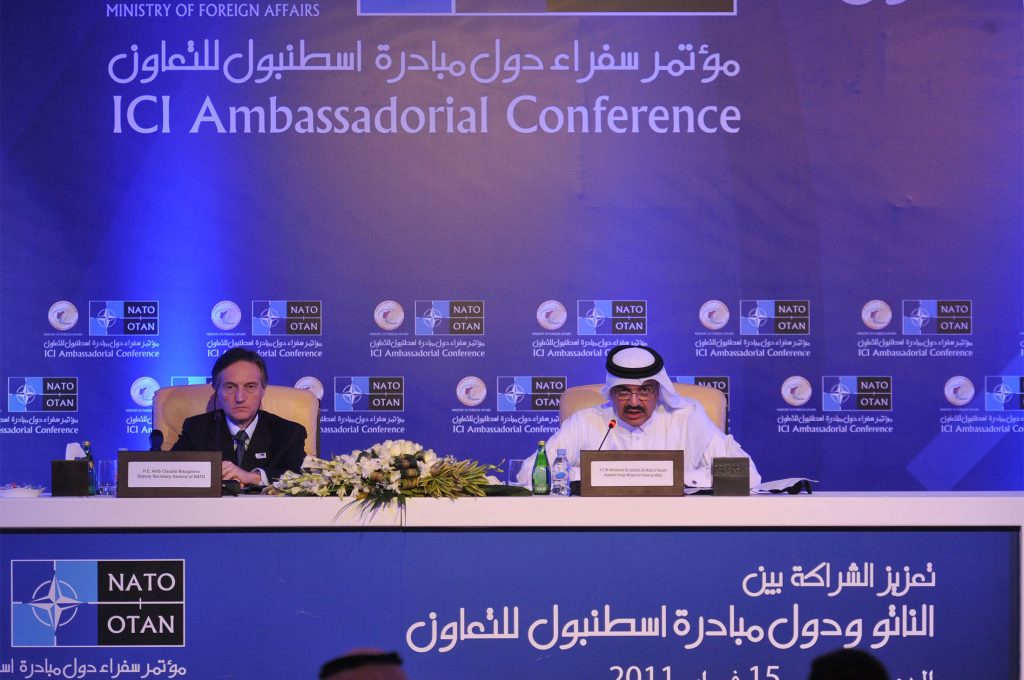
From Jean-Loup Samaan, NATO Review: Some achievements in NATO-GCC relations are worth considering and using. For instance, the Gulf countries have been amongst the most active partners in NATO-led operations (the UAE and Bahrain in ISAF; the UAE and Qatar in Operation Unified Protector). These achievements prove that what is at stake is not NATO’s Gulf policy as a whole but the ICI as a means of implementing it. I have heard this paradox emphasised by some Brussels insiders who argued that these successes could well have taken place anyway.
To prevent the ICI becoming irrelevant in the future, we must refine its methodology and agenda priorities – to bring it closer to NATO and ICI partners’ security concerns.
The first imperative is to extend the bilateral nature of the ICI: the multilateral track should become its core arrangement. This could be developed by creating a strategic dialogue between ICI partners held twice a year, once in Brussels and then once in one of the Gulf capitals. Additionally, Saudi Arabia and Oman could be able to attend as special observers.
The dialogue could include a political dimension by gathering together ministers and chiefs of defence. But its effectiveness would depend on a calibrated mix of diplomats, desk officers and scholars from both sides discussing the ICI agenda. In other words, this NATO-Gulf strategic dialogue should not be a classic, very formal and official gathering but a platform to exchange fresh ideas and promote future cooperation.
A NATO-Gulf strategic dialogue could redirect the partnership towards its long-term goal and include the discussion of timely policy issues such as maritime security, capability-building and countering security vacuums. It could also be used to discuss the stand-off with Iran.
The Iranian issue should not be treated casually. The Iran-threat perception in the Gulf has to be considered with caution. But here too NATO could play a key role in preventing unintentional escalation. Eventually, NATO and GCC countries will have to find a more or less formal framework to shape some kind of deterrence dialogue with Iran. This subset of the NATO-Gulf strategic dialogue would logically engage NATO partners, as well as the Iranians. It would not necessarily involve high level national representatives and would very likely remain at the second-track level.
Though it might sound far-fetched, there is nothing in theory that prohibits Iran from participating in ICI discussions. Still, several political issues would have to be cleared up before: the nature of Iran’s nuclear programme, the willingness of both NATO members and partners to engage with Iran and the compatibility of such an initiative with the current UN, US and EU sanctions regime targeting Tehran. But in the long run, a dialogue of this kind could provide a framework in which to discuss respective military postures, exchange assessments on potential flashpoints, design safety valves and eventually to avoid miscalculation.
In general terms, an agenda for NATO-Gulf strategic dialogue may have to accommodate the national preferences and inclinations of the 28 Allies, in particular those who already have special relations with the GCC as a whole or/and with its individual countries. But owing to the interdependence between stakeholders in the security issues mentioned and also to the Allies’ new emphasis on cooperative security, this dialogue would not be redundant.
Jean-Loup Samaan is a researcher at the NATO Defence College in Rome, Italy. The views expressed here are his alone. (photo: NATO)
Image: nato%2010%2012%2011%20NATO%20ICI.jpg
